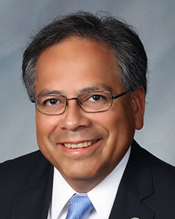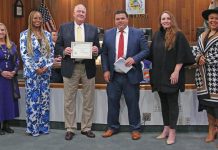With city officials increasingly besieged with requests for public documents and facing two major lawsuits, Cypress is adding more layers of legal advisors to the city’s payrolls.
On Friday, the city council met in extraordinary session, not in Council Chambers, but in a small meeting room, voting to authorize City Manager Peter Grant to hire additional legal counsel to fight two lawsuits now filed against the city.
Council member Frances Marquez was the only “no” vote as the Council approved a motion by Council member Jon Peat to allow Grant to secure legal services to begin defending the city in the upcoming lawsuits.
The city’s current legal advisor Fred Galante, representing the law firm of Aleshire and Wynder, has been especially busy since the Malibu law firm of Shenkman and Hughes sent a demand letter to Cypress in September of 2021 alleging the city is in violation of the California Voting Rights Act.
In addition, Galante has advised the Council up until now regarding another lawsuit, this one filed by a statewide organization, Californians Aware (CalAware), alleging the Cypress city council has violated the Ralph M. Brown Act by its consistent misuse of executive session to discuss whether to convert to district-based elections.
The Council has only met in executive session since Shenkman’s firm notified the city in September of 2021 of alleged CVRA violations, which the city rejected.
The city’s consistent disregqard for public inclusion in CVRA discussions prompted the CalAware lawsuit.
“The people have the right to instruct their representatives, petition government for a redress of grievances, and assemble freely to consult for the common good,” the CalAware petition claims.
Also, among the citations, the petition states “the people have the right of access to information concerning the conduct of the people’s business, and, therefore, the meetings of public bodies and the writings of public officials and agencies shall be open to public scrutiny.”
Although it is not yet clear that the city has been served with the districting lawsuit, they are obviously aware that it has been filed and are looking for lawyers who will defend the city in court.
Galante has refused to comment on the CVRA lawsuit, claiming to have not yet seen it.
Galante has said in a letter, however, that “it would be impossible to show that districts would enhance the ability of any protected class to elect candidates of its choice or influence election outcomes.”
“To the contrary, splitting up the votes of those protected classes would have the effect of preventing them from voting as a larger class to elect a candidate of their choice,” Galante wrote to Shenkman.
In addition to Cypress, other Orange County city cities like Brea and Irvine, are also resisting move to districts.
In the meantime, the city’s legal bills are expected to increase. Now, with two additional lawsuits, the city is preparing to spend additional taxpayer funds on attorneys as they are ‘lawyering up.’
Following the June 10 special meeting, which was held in the same manner as one this past Friday, Grant was given authority to hire additional legal counsel because of the city receiving accelerating requests for documents under the Public Records Act.
Records indicate that within two business days of the June 10 meeting, Grant executed an amendment on a 2001 agreement with the Costa Mesa law firm of Rutan and Tucker to provide services to the city to assist with “review and response” of PRA requests.
According to the amendment, attorneys with Rutan and Tucker will be compensated $300 per hour for “assistance with review and responses” to Public Records Act requests, $350 per hour for litigation “relating to the assistance with review and response” to PRA requests, with $135 per hour paid for any paralegals working with the attorneys.
In addition, the agreement stipulates that Rutan and Tucker “shall be entitled to reimbursement for all reasonable and necessary expenses incurred.”
Accordingly, the reimbursable expenses “shall include but are not limited to, duplications, long distance telephone costs, reimbursable travel costs, department clerks, reproduction expenses, telecopier charges, messenger services, without limitation court filing fees, court reporter fees, witness fees and other reasonable and necessary out of pocket expenses.”
Apparently, the agreement envisions much more than “review and response” for the city’s new “special counsel,” as the agreement also appears to give the firm the authority for additional reimbursement items that are generally involved with initiating legal action.
In addition, for Grant, it appears as though the new “special counsel” was retained in time to allow Cypress to complete an extended public records request that involved communications from Grant. Accordingly, the special counsel then declared off limits to the public.
On June 29, Cypress City Clerk Alisha Farnell sent the final batch of records connected to a request that had been filed in early May by activists Katie Shapiro and Malini Nagpal. While some of the records were, in fact, earlier sent to Shapiro and Nagpal, it appears as though some of Grant’s requested communications were not released.
Farnell’s note to the Cypress residents read as follows: “Please note that certain records have either not been produced or have been partially redacted pursuant to the attorney-client privilege and work-product doctrine.”
“The public interest served by not disclosing the record clearly outweighs the public interest served by disclosure of the record as determined by the City’s Special Legal Counsel, Todd Litfin of Rutan & Tucker,” Farnell’s email continued.
Now, she and Shapiro are demanding the documentation to justify the determination not to release those records and how the public interest is better served by not disclosing them.
In an email, they provided Farnell with legal citations demanding documentation, including “a full and complete legal analysis, analyses, and rationale(s) used to determine that the public interest served by not disclosing the record clearly outweighs the public interest served by disclosure of the record,” among other items.
At Friday’s special meeting, Galante confirmed that during the closed session portion of the meeting, the Council had discussed the procurement of additional outside legal counsel to defend the city against the two new lawsuits (CVRA and CalAware).
In addition, the city’s legal advisor said the Council discussed a plan to form an “ad-hoc committee” to deal directly with the attorneys.
“We thought it would be helpful to have an ad hoc subcommittee of the city council to help advise and provide feedback. Obviously, any significant issues would go to the entire council,” said Galante.
“The next step would be to authorize the city manager to retain special counsel to respond to the complaints. The theory is there are other law firms that have been involved all the way through trial in these cases, and it may be beneficial for the city to work with another law firm in association with our firm to handle the defense of the matter,” the city attorney said.
“And I can work with your city manager on some good potential candidates,” he added.
Mayor Paulo Morales said he thought a two-member ad-hoc committee to work with what will eventually be a team of lawyers was a good idea.
“My thoughts for an ad hoc committee is just there is a lot of information that has to be reviewed, obtained, looked at for the accuracy of that information, and that’s certainly important,” said Morales.
“And quite specifically, in looking at an ad hoc committee, I was thinking of both myself and the Mayor Pro Tem” to serve on the Ad-hoc committee, he said, to which Marquez immediately objected.
“I’m concerned that there are two people with the same views on the ad hoc committee,” said Marquez, who thought she, and perhaps the public, would not get the whole story.
“It is possible that I will be locked out of the information,” she said, “especially if it’s given that my colleagues have thought that I actually solicited this lawsuit. I never solicited this lawsuit, but they tend to think that I solicited this lawsuit and that’s not the truth. I have never met Kevin Shenkman and never spoken to him.”
Shenkman, in an interview, confirmed he has never met Marquez, never corresponded with her nor ever spoken to her.
Further, the Malibu attorney said Monday that the council majority resisting districts seemed to essentially be “looking after their own interests, not the public interest.”
“It’s time for them to be grown-ups,” he said.
He said Buena Park made the switch to district-based elections with little or no legal expense. Anaheim, which put up a brief fight, then settled, spent approximately $3 million on lawyers, said Shenkman. Palmdale spent about $5.5 million, he said, and Santa Monica could spend $30 million.
Shenkman said taxpayers won’t be happy that Cypress taxpayer money, which should be spent on other things, is going to be wasted on a lawsuit the city must know they cannot win.
“They are starting down a path of wasting their taxpayer dollars to carry on a fight for their own city council seats and nothing more,” he said. He said there could be political consequences as well.
In Santa Monica, three incumbents, the most vocal against district elections, were unseated in the 2020 elections, said Shenkman, mostly for wasting money, he said. The Council members in favor of districting were re-elected, said Shenkman.
“You have to go back 30 years or more to find three incumbents unseated in the same election,” he said.
He said Cypress taxpayers won’t be happy when they start spending millions in legal fees.
Marquez has been the only Council member consistently voting against rejecting the allegations of CVRA violations.
The debate ended, however, much as it had before. Peat’s motion to authorize Grant to work with Galante to find defense Counsel and to appoint Morales and Mayor Pro-tem Anne Hertz-Mallari to an ad-hoc Committee was approved.












